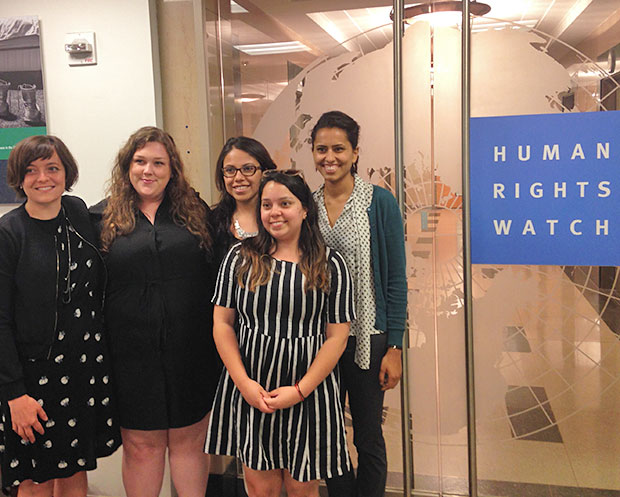Students at Humphrey School Collaborate with Human Rights Watch to Research Human Rights in America

When people in the United States think about human rights, such topics as famine, torture, and warfare in other countries often come to mind before issues here at home. But a new research project at the University of Minnesota's Humphrey School of Public Affairs and the College of Liberal Arts—the latest in an extensive partnership with Human Rights Watch (HRW)—will focus the human rights lens on the U.S.
More than a dozen graduate students will survey adults in the United States to gauge how they feel about key human rights issues. The project, a collaboration of the University’s Human Rights Program, Human Rights Watch, and the Minneapolis-based Center for Victims of Torture, is driven by the rise of negative discourse about communities of color, the LGBTQ community, immigrants, and refugees throughout the country.
“Human Rights Watch is one of the best-known and most effective organizations in the world, and this ongoing partnership gives our students a lot of insights into what they do,” says Humphrey School of Public Affairs Professor Jim Ron. “It’s a valuable experience for our students and for the Master of Human Rights (MHR) degree program here at the University.”
The University of Minnesota is the only school in the country to have such a partnership with Human Rights Watch, an international organization that focuses on researching and reporting human rights abuses, and advocating for policy changes that promote human rights and justice worldwide.
It began in 2014, when Ron, co-director of the University’s Master of Human Rights degree program and a longtime consultant for Human Rights Watch, asked the organization how his students could get involved in its work.
It didn’t take long for him to get an answer. Over the next three years, HRW asked University students to help evaluate the success of its research methods, its reporting on human rights abuses in various countries, and its impact in advocating for change. Students work on one project per academic year, and so far they have completed three.
Such analysis is vital for the organization to help measure its success at meeting one of its main goals: to bring about positive and sustainable improvements in human rights.
Although the research opportunity is offered through the MHR program, graduate students from throughout the University can apply.
Master of Human Rights degree candidate Nora Radtke participated in one of last spring’s research collaborations, which measured the impact of two major reports by HRW about police brutality in India and Brazil.
“We answered questions like, who read these reports? Was there any media attention to the issue? Did the reports lead to any changes, or spur action by local governments?” Radtke says.
In May, the students traveled to New York to present their results to HRW officials. For Radke, the opportunity proved extra beneficial: HRW offered her a summer internship to continue her work on the subject.
“As a graduate student, getting an inside look into HRW’s advocacy was an incredible opportunity,” she says.
Radtke is also participating in the upcoming project on Americans’ opinions on human rights issues. The online survey of 3,000 respondents nationwide will ask about their attitudes toward people of different races, genders, immigration status, religious backgrounds, and the like. The results may help researchers better understand what kind of psychological characteristics lead people to be more or less supportive of human rights issues.
“The hope is that once we gather this data and analyze why these attitudes are prevalent, Human Rights Watch will use the findings to make its advocacy and messaging strategies more effective,” says Radtke.
The research project has received $40,000 in funding from the University’s Human Rights Initiative, and Human Rights Watch is contributing another $10,000.

